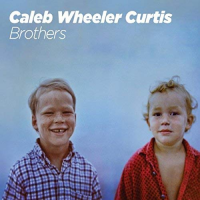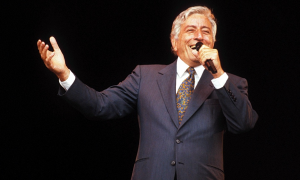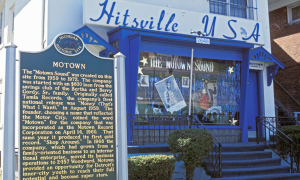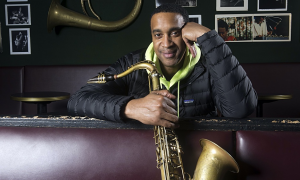Home » Jazz Articles » Beauty, Love and Justice: Living A Coltranian Life » Terence Blanchard: Music, Social Justice and Raising Awa...
Terence Blanchard: Music, Social Justice and Raising Awareness About Violence Against Black People

With a heavy heart, I struggle with the knowledge that there are mothers and fathers who lost children to senseless horrific racism. It is a fact Sybrina Fulton has dedicated herself to keeping her son's name alive, in so doing his tragic loss was not in vain. She must wake every day with the hole that burns in her heart from the unimaginable injustice which took her son away from her and ended a precious life that should have lived fully and completely. "Rest in Power Trayvon, it makes no sense to get angry or mad and do nothing. Get angry, get mad and get to work." Sybrina
When I listen to Grammy Award winner, internationally renowned jazz trumpeter, and composer Terence Blanchard I hear the human heart, I hear nature, I hear God's divinity speaking through humanity. He is on a Coltranian journey which I define as a life guided by a loving purpose. His sound brings joy, celebration, tenderness, and in his latest albums, there is no doubt I can hear crying which comes from the sorrow of injustice and devastation from the murder of unarmed black people. I hear him wrestle with the pain of the senseless loss of Trayvon Martin, Tamir Rice, Philando Castile, Eric Garner, Sandra Bland and police officers killed in tragic violence.
The music creates the continued cries that wail, this must stop! I hear the essence of Dr. Martin Luther King, Jr. and Malcolm X who continue to teach us all by their example. And I hear the heavy heart of Terence Blanchard asking why this way of life continues in which people only see their truth, instead of embracing the responsibility of all citizens to understand each other's truths, to bridge all the gaps to form one nation under God, indivisible with liberty and justice for all, and reaching further across the entire globe.
In Terence you know you are speaking to a man who loves all people and his empathy comes right out of the horn. Coltrane said, if you live the truth it will indeed come out of your horn. For Coltrane, it was the saxophone and for Terence, it is his trumpet. But he does not do it alone, as he leads his most recent band, the E-Collective. Terence Blanchard has created socially conscious music with his bandmates. In his albums Live, Breathless, and Choices he leads the way as a force for good in the battle against evil and leads the way with an angelic command for kindness to flourish. Accompanied by his exemplary bandmates he courageously and willingly carries the cross in a hope that people examine their biases. The E-Collective includes guitarist Charles Altura, bassist David Ginyard, keyboardist Fabian Almazan and drummer Oscar Seaton.
Terence is also encouraged by John Coltrane's example and message. He found himself deeply moved by John Coltrane's A Love Supreme when in high school. Highly valuing the chant-like quality in John's amazing music, he knew the saxophonist played in tune with what was happening in the universe. Music for Trane was about making a statement according to Terence. The first time he heard Coltrane's masterpiece "Alabama" he was stopped in his tracks, and he said it made him cry like a baby. The song will never let us forget the deaths of Denise McNair, Carole Robertson, Cynthia Wesley, Addie Mae Collins, who are the precious children killed in 1963 by members of the Ku Klux Klan, at the 16th Street Baptist Church bombing in Birmingham. Coltrane's song "Alabama" also helps us heal, and remember so we continue the conversation to bring change through hope and action.
In 1966 in an interview with jazz writer and historian Frank Kofsky, John Coltrane responds to this question on social issues, "Do you find in your own groups or among musicians you're friendly with that these issues are important and that you do talk about them?" Trane states, "Oh, they're definitely important; and as I said, the issues are part of what is at this time. So naturally, as musicians, we express whatever is." John also tells Kofsky that listening to the music is an action in which people can be affected. "It seems to me that the audience in listening, is in an act of participation, you know. And when you know that somebody maybe moved the same way you are, to such a degree or approaching the degree, it's just like having another member of the group." Coltrane continues," I think music is an instrument. It can create the initial thought patterns that can change the thinking of people." Terence is a musician with the same essence as Trane doing what he was born to do with Amazing Grace. I see them as leaders who can help bring out the best in us. John also stated, "Good can only bring good." I am sure Terence Blanchard would agree.
When starting my interview with Terence I reminded him that I met him before. A few years ago, I walked into the Blue Note Jazz club in New York City to hear him perform which I found formidable with a purifying sense of being touched by honesty through music. That evening, I heard the recorded voice of Dr. Cornel West loudly floating through the club through the speakers as Terence matched up his music with Dr. West's ability to say what the heart feels in his song "Choices." I attended the show with Dr. West and did not have a warning that this moment was about to occur, quite a memorable experience for me.
The fact is Terence was so profoundly impacted by Dr. West's philosophical body of work he included his spoken word on three albums. The words come directly from a Princeton University conversation in which Blanchard and West sat down together to dig into the meaning of life and death. Sharing what it means to be black in America, what it means to love, and what it means to try to be forces for good when there are also evil forces in the world. The music goes deep into coming to terms with understanding more and more what choices we make will define our character. The conversation between these two leaders impacted both of them, and for Terence the existential questions West posed are through lines. Dr. West speaks of the master musician with great respect. "Terence is a great figure in jazz and contemporary music. He is the real thing at the deepest level." West linguistically asks, while Blanchard musically asks, "What kind of human being are you going to be?"
In his song "Soldiers" on the albums Live and Breathless, we are reminded that Martin Luther King Jr. once walked the earth, with a willingness to love people so much he would sacrifice his life for us. King told us, "I refuse to accept the view that mankind is so tragically bound to the starless midnight of racism and war that the bright daybreak of peace and brotherhood can never become a reality." And we know Trane would agree, as he believed with brotherhood, war and poverty would not exist. Terence is also guided by the spirit and sacrifice of Malcolm X, and all the past and current social justice workers who give so much and get very little material reward. Their willingness to be the change, is their gift to us all. "Soldiers" sounds like a march for justice. Terence honors the resilience of people who continue to make great sacrifices to help create the change that is needed.
Terence Blanchard and the E-Collective were recently on tour creating the album Live which felt like a caravan of love. They chose four cities in which serious incidents of gun violence occurred in the killing of black people by the misuse of police power and also where officers were tragically gunned down. The music preaches and teaches that gun violence should not be tolerated. Traveling to Minneapolis, Cleveland, Dallas, and New York for civic engagement, activism, and asking the question what are you going to do? Terence is tired of just the talk. He is looking for activity and hoping we all get an education by keeping the conversation going. During this tour of four cities, the band gave and received enlightenment. He was complimented highly when a white audience member shared how the music made him think differently about the pain and suffering black people are experiencing through racism.
On tour in Wisconsin however, an audience member told him after the show, "I don't give a fuck about your social justice message." Astonished too while on that tour one of his bandmates who is African American was refused service in their hotel restaurant. He went into the restaurant alone for breakfast, and the hostess told him he could not be seated without a reservation...the restaurant was empty.
The masterful song" See Me As I Am" on the album Breathless speaks to preconceived notions, and seems to me like a poem and a prayer. Blanchard tells me "that the promise of America has been a lie. Some people do not want the melting pot to happen. Fear and doubt are created in people's minds." His music is trying to combat that. During his Live tour, he went to the Minneapolis school were Philando Castille, a man killed by a police officer during a traffic stop. The principal said the children still ask about him and loved him. Terence and the band played for the students and staff. Looking out into their faces he was reminded of a Jackson Pollack painting. Kids from all walks of life, all different hues, genders, religious backgrounds attend this school. "They are the best of our country." Terence was so uplifted by these children who were not making biased judgments proving that this school was doing something right.
Blanchard is heartbroken knowing Castille was killed by a police officer who did not see his goodness, and he feels the officer's fear-driven biases led to this tragic death. "Here is a guy who did everything he was supposed to do, he was working, taking care of his family, a role model to the students, he had registered his gun, he responsibly informed the cop he had a licensed gun, and he still lost his life because the cop didn't see him, the cop saw an image, the cop saw something that was told to him his entire life that was threatening. He didn't see the person." A video from the scene exposes the moments before Castille's death in which the officer pointing a gun at Philando during a traffic stop feared he was reaching for a gun. Castille was reaching for his wallet. You can hear Castille in anguish say as he was dying "I wasn't reaching for a gun." The police officer was tried for manslaughter and found not guilty.
The reason he wrote "See Me As I Am" which is on the album Breathless is personal. There are times when he meets people and during the conversation, he can see the moment when their preconceived notions about a black man changes. "It is a terrible thing to go through.." We both agree that a curriculum in which critical thinking on these issues should be mandatory in schools. I was proud to share my Kids for Coltrane program is rooted in that work.
Terence Blanchard is also the musical composer for Spike Lee's acclaimed films since 1991, including Lee's latest film BlacKkKlansman which received the Grand Prix award at Cannes. The film continues the conversation on racism in America. We meet members of the police force, the Black Panthers and the Ku Klux Klan in this true story of an African American police officer who infiltrated the KKK. Spike's film is based on a story from the 70's but artistically ends at a 2017 Unite the Right rally in Charlottesville, Virginia. We are reminded of the death of Heather Heyer a victim of an attack that chilling day who lost her life while peacefully marching in a counter protest when a car intentionally rammed into the crowd.
Spike has a great trust in Blanchard, and sees his excellence. "I know it is going to sound great and help me tell the story," Spike Lee has said about Blanchard. Terence feels Spike views music as a separate character and considers him a cinematic visionary. "When a person puts that much trust in you, you never want to let them down," Terence said. After viewing the film which includes Black Panthers, I remembered learning about the life of Geronimo Pratt who had joined the Panthers.
He was a kind and loving son, and brother of six siblings. Born Floyd Gerald Pratt, he was a high school quarterback, studied at UCLA and served in Vietnam and came back with a Purple Heart. Like Terence Blanchard, he was also from Louisiana. He was a soldier for his country and a soldier for social justice within his country. He was convicted of a murder in 1972. With unwavering dedication from his supporters, Geronimo was released from prison after 27 years for a murder he said he did not commit. Tried under a system which presented as the main witness against him a FBI informant. This was during a period of history in which there was a government COINTELPRO operation and certain African Americans were considered suspect. Geronimo became of age when America was struggling with race relations. Passionate to help people get along and with a deep love for black people he joined the political Black Panther Party in hopes of a solution in a dangerous, callous and violent world. Following in the steps of Malcolm X who in his later years tried with unwavering love and strength to bring people of all races together.
Listening to Terence's music, you know he is connecting to the people who move and inspire him. It seems to me his music is a call to action for each one of us to look deeper at the soldiers of social justice, the love warriors, mostly unsung heroes who are willing to sacrifice in the name of humanity. The message is we the citizens of this grand country must raise up all the great unsung heroes who inspire us. We must take loving action and be that example and support system for the younger generation.
Reminiscing while doing research for this article, again thinking about Spike's films, musically scored by Terence I remembered being on the set of Jungle Fever with my mother and children one afternoon, just saying hello to my cousin John Turturro who was in the film. Jungle Fever came out after a 1989 racial conflict in Brooklyn, NY in which Yusef Hawkins was murdered by racist youths. Lee's films help us come to terms with reality and the importance of seeing one another. I remembered another tragic occurrence from that decade. It was December 1986 and I was on the Belt Parkway. Traffic was piling up, and as my car got closer to where the police officers stood, I saw a lifeless body. The traffic pushed along and soon my car was on its way leaving the tragic scene as just a memory. However, it was not until the next day that I was to realize I saw the body of Michael Griffith. This 23-year-old black young man who immigrated from Trinidad about a decade before was beaten along with his mother's future husband and a friend by a gang of white teenagers. They came into the area trying to get assistance after their car broke down. Michael Griffith ran onto the parkway that evening to escape the brutality from the gang and was struck by a car. That was the body I saw lying dead.
The ringleader Jon Lester according to the New York Times was an 18-year-old who came from England when he was 14 years old, and helped incite the brutal charge that led to this crime. What pent up lies told by society did this young man and his friends believe that brought out vile racist words and actions? Lester was imprisoned until 2001 for manslaughter and then extradited back to Britain. Trying to make a successful life after prison, he suffered deeply from depression and eventually killed himself in 2017 at the age of 48 years old. When hearing about his passing the mother of Michael Griffith, Jean Griffith Sandiford responded. "In my heart, I'm sorry to hear of his death. Regardless of what happened, I always forgave them."
Amazing Grace has allowed the essential conversation to continue, and it seems urgent again. Terence Blanchard's healing music will not let us look away from the fact decade after decade too many people want to see only their own truths, and in doing that biases grow like a cancer that keeps killing and destroying lives. Blanchard's music helps absorb the pain while also encouraging a call to action to grow love, not hate. His brilliance leads us to have the conversation to see the humanity in one another.
I traditionally go to John Coltrane's gravesite to meditate on his birthday. September 23, marks his 92nd birthday. I feel uplifted by Terence's music with an intense need to stay the course toward social justice in these times, and understand we all have much more to do to bring people together. Coltrane and Blanchard connect me to the work of Paolo Freire who inspired me while earning my advanced degrees in education. He was a Brazilian educator and philosopher who advocated teaching critical thinking to students to help create a better world. His seminal book Pedagogy of the Oppressed and his pedagogical work brings hope. Freire stated, "Curiosity as restless questioning, as movement toward the revelation of something hidden, as a question verbalized or not, as search for clarity, as a moment of attention, suggestion, and vigilance constitutes an integral part of the phenomenon of being alive. There could be no creativity without the curiosity that moves us and sets us patiently impatient before a world that we did not make, to add to it something of our own making." Perhaps it is curiosity which grows in each of us that will encourage seeing the humanity in the other. This essential action may save and enrich the world, and answer Blanchard's prayer for the continued conversation he encourages in his song..."Talk to Me."
Tags
PREVIOUS / NEXT
Terence Blanchard Concerts
Support All About Jazz
 All About Jazz has been a pillar of jazz since 1995, championing it as an art form and, more importantly, supporting the musicians who make it. Our enduring commitment has made "AAJ" one of the most culturally important websites of its kind, read by hundreds of thousands of fans, musicians and industry figures every month.
All About Jazz has been a pillar of jazz since 1995, championing it as an art form and, more importantly, supporting the musicians who make it. Our enduring commitment has made "AAJ" one of the most culturally important websites of its kind, read by hundreds of thousands of fans, musicians and industry figures every month.

























